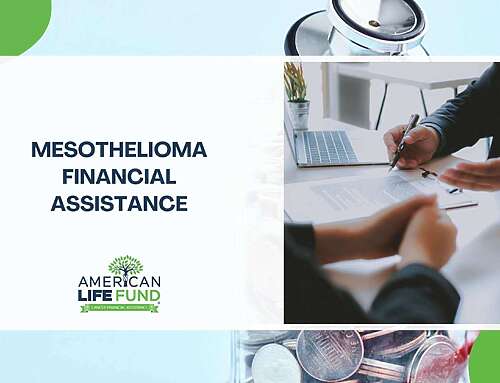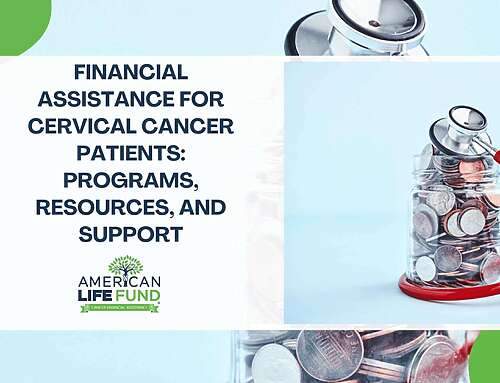Receiving a terminal illness diagnosis can be devastating, and it can be challenging to navigate the complex financial landscape that often comes with it. The high cost of medical treatments, coupled with a fixed income and the need to plan for the future, can create overwhelming stress for those facing a terminal illness.
However, several financial benefits for terminally ill individuals that can help ease the burden and provide peace of mind. This blog post will explore the financial benefits and options available for terminally ill individuals.
From viatical settlements to financial assistance programs, we’ll provide actionable advice and tips to help you make informed decisions and ensure you have the resources to focus on what matters most: spending time with your loved ones.
How to Ensure Financial Security For Your Loved Ones
Ensuring financial security for your loved ones is an important aspect of financial planning. Whether you’re planning for your retirement or thinking about your family’s financial future after your passing, there are several steps you can take to help provide financial security for your loved ones.
Create a comprehensive financial plan: It can help you identify your goals and create a roadmap. It can also help you assess your financial resources, including income, savings, investments, and insurance coverage.
Review and update your insurance policies: Life insurance and disability insurance can provide financial protection for your loved ones in the event of your death or disability. It’s important to review your policies periodically to ensure your coverage is adequate and current.
Consider setting up a trust: A trust can be useful for managing and distributing your assets after passing. A trust can help you avoid probate, reduce taxes, and provide ongoing financial support for your loved ones.
Name beneficiaries on your accounts: Naming beneficiaries on your retirement accounts, life insurance policies, and other financial accounts can help ensure that your assets are distributed according to your wishes.
Establish an emergency fund: An emergency fund can help cover unexpected expenses and provide a financial safety net for your family. Aim to save three to six months’ living expenses in an easily accessible savings account.
By taking these steps and regularly reviewing and updating your financial plan, you can help ensure financial security for your loved ones now and in the future.
Understanding Viatical Settlements: What They Are And How They Work
Viatical settlements are a type of financial transaction allowing individuals with a terminal illness to sell their life insurance policies to a third-party buyer for a lump sum. The buyer becomes the policy’s beneficiary and takes over the premium payments until the policy matures. In exchange for selling the policy, the terminally ill individual receives a cash payment that can be used to cover medical expenses, improve their quality of life, or provide for their loved ones.
Viatical settlements can be a viable option for those with a life insurance policy that they no longer need or cannot afford to maintain. However, it’s important to note that the amount received in a viatical settlement is substantial but is less than the policy’s death benefit.
Additionally, viatical settlements can have tax implications and may impact eligibility for government benefits. Working with a financial advisor or lawyer with experience in viatical settlements is crucial to ensure that you make an informed decision and understand the potential risks and benefits.
Overall, viatical settlements can provide a valuable source of financial support for terminally ill individuals, allowing them to access funds when needed.
Financial Assistance Programs For Cancer Patients
Cancer treatment can be incredibly expensive, and many cancer patients face financial challenges. Fortunately, several general financial assistance programs available for cancer patients in the United States can help cover the cost of medical treatments and related expenses.
Medicaid: A joint federal and state program that provides health coverage to low-income individuals and families. Medicaid can help cover the cost of doctor’s visits, hospital stays, medications, and other medical expenses.
Social Security Administration Disability Benefits: Provides disability benefits for individuals who cannot work due to a medical condition, including cancer.
American Cancer Society: Offers a variety of programs and services to cancer patients, including financial assistance for transportation, lodging, and other expenses related to treatment.
Cancer Financial Assistance Coalition: Provides financial assistance and guidance to cancer patients.
Note that eligibility requirements and available resources vary depending on the program or organization. Patients should research and contact these organizations to learn more about their specific financial assistance programs and requirements.
Additionally, patients should work with a financial advisor or social worker to understand their options and make informed decisions about their finances during cancer treatment.
Navigating The Complex World of Healthcare Costs
Navigating the complex world of healthcare costs can be daunting, especially for those with chronic or serious illnesses. Medical bills and related expenses can quickly add up, leaving many struggling to manage their finances.
However, with careful planning and strategic decision-making, it is possible to manage healthcare costs and avoid financial hardship. Here are some tips for managing healthcare expenses:
Understand your insurance coverage: Familiarize yourself with your insurance policy, including deductibles, copays, and out-of-pocket maximums. Knowing what your insurance will cover can help you plan and budget for medical expenses.
Shop around for healthcare providers: Research different healthcare providers and compare costs. Ask for estimates before undergoing procedures or treatments to ensure you get the best value for your money.
Take advantage of preventive care: Regular check-ups and preventive care can help catch health issues early, potentially reducing the need for costly treatments later on.
Consider generic medications: Generic medications can be as effective as brand-name drugs and are often significantly cheaper.
Negotiate medical bills: If you receive a high medical bill you cannot afford, try negotiating with your healthcare provider or hospital. Many providers are willing to work out payment plans or reduce costs for those in need.
Seek financial assistance: Many hospitals and healthcare organizations offer financial assistance programs for those who cannot afford medical bills. Research these programs and apply if you are eligible.
Managing healthcare costs can be a challenging task. However, with careful planning and proactive decision-making, avoiding financial hardship and maintaining financial stability is possible.
Tax Benefits For Terminally Ill Individuals
Tax benefits for terminally ill individuals can ease the financial burden of costly medical expenses and provide much-needed relief during a difficult time. Here are some tax benefits that may be available to terminally ill individuals:
Medical Expense Deductions:
Medical expenses that exceed 7.5% of your adjusted gross income can be deducted from your taxes. This includes expenses related to diagnosis, treatment, and transportation to and from medical appointments.
Deduction For Home Improvements:
Make modifications to your home to accommodate a disability or medical condition, such as installing wheelchair ramps or grab bars. You can deduct these expenses from your taxes.
Disability Tax Credit:
Terminally ill individuals may be eligible for the disability tax credit, which provides a non-refundable tax credit to individuals with a severe and prolonged impairment in physical or mental function.
Pension Income Credit:
If you receive pension income, you may be eligible for the pension income credit, which can help reduce your tax liability.
Terminal Illness Tax Credit:
Some states offer a terminal illness tax credit, which provides a tax credit for individuals who are terminally ill and receiving hospice care.
Navigating tax benefits and deductions can be a complex process, and it’s essential to consult a tax professional or financial advisor to ensure you are taking advantage of all available benefits.
Terminally ill individuals and their families can use these tax benefits to help offset the cost of medical expenses and improve their overall financial stability during difficult times.

Social Security Disability Benefits For The Terminally Ill: Eligibility And Requirements
Social Security Disability Benefits (SSDI) can provide financial assistance to terminally ill individuals who cannot work due to their condition. Here’s what you need to know about eligibility and requirements:
Medical eligibility: To be eligible for SSDI, you must have a medical condition that meets the Social Security Administration’s (SSA) definition of “disability.” This means that your condition must be severe enough to prevent you from performing a substantial gainful activity (SGA) and is expected to last at least one year or result in death.
Work credits: SSDI is a work-based program. To be eligible, you must have earned enough work credits by paying into the Social Security system. Generally, you must have worked five of the past ten years and earned a certain amount of money to be eligible.
Application process: To apply for SSDI, you’ll need to apply to the SSA, along with medical documentation of your condition and work history. The SSA will review your application and decide on your eligibility.
Compassionate Allowances: The SSA has a program called Compassionate Allowances that can expedite the application process for individuals with certain medical conditions, including terminal illnesses.
Benefits: If approved for SSDI, you’ll receive monthly benefits based on your average lifetime earnings. You may also be eligible for Medicare after a certain waiting period.
SSDI benefits can provide a critical source of financial support for terminally ill individuals and their families during difficult times. Navigating the process of applying for SSDI can be complex, especially for terminally ill individuals. It’s important to work with a Social Security attorney or advocate who can help guide you through the application process and ensure you receive all the benefits to which you’re entitled.
What to Consider Before Selling Your Life Insurance Policy
Selling your life insurance policy can provide financial support for those facing terminal illnesses. However, it’s important to consider the following factors before making this decision:
Viatical settlements: If you’re considering selling your life insurance policy, you may be looking into a viatical settlement. Viatical settlements are agreements between the policyholder and a third-party purchaser. The purchaser buys the policy in exchange for a large, lump sum payment to the policyholder. In exchange, the purchaser becomes the policy’s beneficiary and receives the death benefit when the policyholder dies.
Policy value: The amount you can receive for your life insurance policy will depend on various factors, including the policy’s face value, your life expectancy, and the cost of premiums.
Tax implications: The sale of a life insurance policy can have tax implications, including income tax and capital gains tax. It’s important to consult a tax professional to understand the potential tax consequences of selling your policy.
Impact on beneficiaries: Selling your life insurance policy means your beneficiaries will no longer receive the death benefit. It’s important to consider the impact this may have on your loved ones and to communicate with them about your decision openly.
Alternatives: Before selling your life insurance policy, consider alternative options for financial support, such as Medicaid, Social Security Disability benefits, or other financial assistance programs for terminally ill individuals.
Selling your life insurance policy can be a complex decision, and it’s important to weigh the potential benefits and drawbacks before making a final decision. Consider consulting with a financial advisor or other professional to help guide you through this process.
Conclusion
When facing a terminal illness, the financial burden can be overwhelming. However, various financial assistance programs are available that can help ease the financial strain and provide much-needed support.
By understanding the available programs, seeking professional help, keeping detailed records, applying early, providing necessary documentation, and asking for help, you can increase your chances of receiving financial assistance and ensure that you and your loved ones are provided for during this difficult time.
Receiving a terminal illness diagnosis can be devastating, and it can be challenging to navigate the complex financial landscape that often comes with it. The high cost of medical treatments, coupled with a fixed income and the need to plan for the future, can create overwhelming stress for those facing a terminal illness.
However, several financial benefits for terminally ill individuals that can help ease the burden and provide peace of mind. This blog post will explore the financial benefits and options available for terminally ill individuals.
From viatical settlements to financial assistance programs, we’ll provide actionable advice and tips to help you make informed decisions and ensure you have the resources to focus on what matters most: spending time with your loved ones.

How to Ensure Financial Security For Your Loved Ones
Ensuring financial security for your loved ones is an important aspect of financial planning. Whether you’re planning for your retirement or thinking about your family’s financial future after your passing, there are several steps you can take to help provide financial security for your loved ones.
Create a comprehensive financial plan: It can help you identify your goals and create a roadmap. It can also help you assess your financial resources, including income, savings, investments, and insurance coverage.
Review and update your insurance policies: Life insurance and disability insurance can provide financial protection for your loved ones in the event of your death or disability. It’s important to review your policies periodically to ensure your coverage is adequate and current.
Consider setting up a trust: A trust can be useful for managing and distributing your assets after passing. A trust can help you avoid probate, reduce taxes, and provide ongoing financial support for your loved ones.
Name beneficiaries on your accounts: Naming beneficiaries on your retirement accounts, life insurance policies, and other financial accounts can help ensure that your assets are distributed according to your wishes.
Establish an emergency fund: An emergency fund can help cover unexpected expenses and provide a financial safety net for your family. Aim to save three to six months’ living expenses in an easily accessible savings account.
By taking these steps and regularly reviewing and updating your financial plan, you can help ensure financial security for your loved ones now and in the future.
Understanding Viatical Settlements: What They Are And How They Work
Viatical settlements are a type of financial transaction allowing individuals with a terminal illness to sell their life insurance policies to a third-party buyer for a lump sum. The buyer becomes the policy’s beneficiary and takes over the premium payments until the policy matures. In exchange for selling the policy, the terminally ill individual receives a cash payment that can be used to cover medical expenses, improve their quality of life, or provide for their loved ones.
Viatical settlements can be a viable option for those with a life insurance policy that they no longer need or cannot afford to maintain. However, it’s important to note that the amount received in a viatical settlement is substantial but is less than the policy’s death benefit.
Additionally, viatical settlements can have tax implications and may impact eligibility for government benefits. Working with a financial advisor or lawyer with experience in viatical settlements is crucial to ensure that you make an informed decision and understand the potential risks and benefits.
Overall, viatical settlements can provide a valuable source of financial support for terminally ill individuals, allowing them to access funds when needed.
Financial Assistance Programs For Cancer Patients
Cancer treatment can be incredibly expensive, and many cancer patients face financial challenges. Fortunately, several general financial assistance programs available for cancer patients in the United States can help cover the cost of medical treatments and related expenses.
Medicaid: A joint federal and state program that provides health coverage to low-income individuals and families. Medicaid can help cover the cost of doctor’s visits, hospital stays, medications, and other medical expenses.
Social Security Administration Disability Benefits: Provides disability benefits for individuals who cannot work due to a medical condition, including cancer.
American Cancer Society: Offers a variety of programs and services to cancer patients, including financial assistance for transportation, lodging, and other expenses related to treatment.
Cancer Financial Assistance Coalition: Provides financial assistance and guidance to cancer patients.
Note that eligibility requirements and available resources vary depending on the program or organization. Patients should research and contact these organizations to learn more about their specific financial assistance programs and requirements.
Additionally, patients should work with a financial advisor or social worker to understand their options and make informed decisions about their finances during cancer treatment.

Navigating The Complex World of Healthcare Costs
Navigating the complex world of healthcare costs can be daunting, especially for those with chronic or serious illnesses. Medical bills and related expenses can quickly add up, leaving many struggling to manage their finances.
However, with careful planning and strategic decision-making, it is possible to manage healthcare costs and avoid financial hardship. Here are some tips for managing healthcare expenses:
Understand your insurance coverage: Familiarize yourself with your insurance policy, including deductibles, copays, and out-of-pocket maximums. Knowing what your insurance will cover can help you plan and budget for medical expenses.
Shop around for healthcare providers: Research different healthcare providers and compare costs. Ask for estimates before undergoing procedures or treatments to ensure you get the best value for your money.
Take advantage of preventive care: Regular check-ups and preventive care can help catch health issues early, potentially reducing the need for costly treatments later on.
Consider generic medications: Generic medications can be as effective as brand-name drugs and are often significantly cheaper. Explore your options regarding affording cancer medications.
Negotiate medical bills: If you receive a high medical bill you cannot afford, try negotiating with your healthcare provider or hospital. Many providers are willing to work out payment plans or reduce costs for those in need.
Seek financial assistance: Many hospitals and healthcare organizations offer financial assistance programs for those who cannot afford medical bills. Research these programs and apply if you are eligible.
Managing healthcare costs can be a challenging task. However, with careful planning and proactive decision-making, avoiding financial hardship and maintaining financial stability is possible.
Tax Benefits For Terminally Ill Individuals
Tax benefits for terminally ill individuals can ease the financial burden of costly medical expenses and provide much-needed relief during a difficult time. Here are some tax benefits that may be available to terminally ill individuals:
Medical Expense Deductions:
Medical expenses that exceed 7.5% of your adjusted gross income can be deducted from your taxes. This includes expenses related to diagnosis, treatment, and transportation to and from medical appointments.
Deduction For Home Improvements:
Make modifications to your home to accommodate a disability or medical condition, such as installing wheelchair ramps or grab bars. You can deduct these expenses from your taxes.
Disability Tax Credit:
Terminally ill individuals may be eligible for the disability tax credit, which provides a non-refundable tax credit to individuals with a severe and prolonged impairment in physical or mental function.
Pension Income Credit:
If you receive pension income, you may be eligible for the pension income credit, which can help reduce your tax liability.
Terminal Illness Tax Credit:
Some states offer a terminal illness tax credit, which provides a tax credit for individuals who are terminally ill and receiving hospice care.
Navigating tax benefits and deductions can be a complex process, and it’s essential to consult a tax professional or financial advisor to ensure you are taking advantage of all available benefits.
Terminally ill individuals and their families can use these tax benefits to help offset the cost of medical expenses and improve their overall financial stability during difficult times.

Social Security Disability Benefits For The Terminally Ill: Eligibility And Requirements
Social Security Disability Benefits (SSDI) can provide financial assistance to terminally ill individuals who cannot work due to their condition. Here’s what you need to know about eligibility and requirements:
Medical eligibility: To be eligible for SSDI, you must have a medical condition that meets the Social Security Administration’s (SSA) definition of “disability.” This means that your condition must be severe enough to prevent you from performing a substantial gainful activity (SGA) and is expected to last at least one year or result in death.
Work credits: SSDI is a work-based program. To be eligible, you must have earned enough work credits by paying into the Social Security system. Generally, you must have worked five of the past ten years and earned a certain amount of money to be eligible.
Application process: To apply for SSDI, you’ll need to apply to the SSA, along with medical documentation of your condition and work history. The SSA will review your application and decide on your eligibility.
Compassionate Allowances: The SSA has a program called Compassionate Allowances that can expedite the application process for individuals with certain medical conditions, including terminal illnesses.
Benefits: If approved for SSDI, you’ll receive monthly benefits based on your average lifetime earnings. You may also be eligible for Medicare after a certain waiting period.
SSDI benefits can provide a critical source of financial support for terminally ill individuals and their families during difficult times. Navigating the process of applying for SSDI can be complex, especially for terminally ill individuals. It’s important to work with a Social Security attorney or advocate who can help guide you through the application process and ensure you receive all the benefits to which you’re entitled.
What to Consider Before Selling Your Life Insurance Policy
Selling your life insurance policy can provide financial support for those facing terminal illnesses. However, it’s important to consider the following factors before making this decision:
Viatical settlements: If you’re considering selling your life insurance policy, you may be looking into a viatical settlement. Viatical settlements are agreements between the policyholder and a third-party purchaser. The purchaser buys the policy in exchange for a large, lump sum payment to the policyholder. In exchange, the purchaser becomes the policy’s beneficiary and receives the death benefit when the policyholder dies.
Policy value: The amount you can receive for your life insurance policy will depend on various factors, including the policy’s face value, your life expectancy, and the cost of premiums.
Tax implications: The sale of a life insurance policy can have tax implications, including income tax and capital gains tax. It’s important to consult a tax professional to understand the potential tax consequences of selling your policy.
Impact on beneficiaries: Selling your life insurance policy means your beneficiaries will no longer receive the death benefit. It’s important to consider the impact this may have on your loved ones and to communicate with them about your decision openly.
Alternatives: Before selling your life insurance policy, consider alternative options for financial support, such as Medicaid, Social Security Disability benefits, or other financial assistance programs for terminally ill individuals.
Selling your life insurance policy can be a complex decision, and it’s important to weigh the potential benefits and drawbacks before making a final decision. Consider consulting with a financial advisor or other professional to help guide you through this process.
Are There Any Restrictions on How The Funds From a Viatical Settlement Can be Used?
Once you receive funds from a viatical settlement, you can utilize them as needed. There are typically no specific restrictions on how you can spend the money. Whether you want to cover medical expenses, improve your quality of life, pay off outstanding debts, or provide financial support for your loved ones, the choice is yours.
The purpose of viatical settlements is to provide financial assistance and alleviate the financial burdens associated with a terminal illness. The funds can be a valuable resource to help you navigate through this challenging time and focus on what matters most to you.
Can I Sell my Life Insurance Policy if I Have a Chronic Illness But Not a Terminal Illness?
Viatical settlements are primarily designed for individuals with a terminal illness, where life expectancy is typically two years or less. However, if you have a chronic illness but not a terminal illness, you may still have options available to you.
One alternative to consider is a life settlement, which is similar to a viatical settlement but is typically intended for individuals with a life expectancy of more than two years. Life settlements allow you to sell your life insurance policy to a third-party buyer for a lump sum, providing you with immediate financial assistance.
It’s important to note that eligibility for life settlements can vary based on factors such as age, policy type, and health condition. Consulting with a viatical settlement company or a financial advisor who specializes in these transactions can help you explore your options and determine the best course of action based on your individual circumstances.
Conclusion
When facing a terminal illness, the financial burden can be overwhelming. However, various financial assistance programs are available that can help ease the financial strain and provide much-needed support.
By understanding the available programs, seeking professional help, keeping detailed records, applying early, providing necessary documentation, and asking for help, you can increase your chances of receiving financial assistance and ensure that you and your loved ones are provided for during this difficult time.





